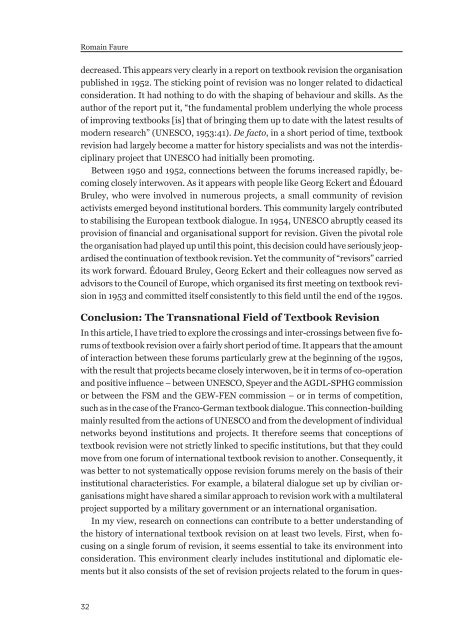Download issue - Umeå universitet
Download issue - Umeå universitet
Download issue - Umeå universitet
You also want an ePaper? Increase the reach of your titles
YUMPU automatically turns print PDFs into web optimized ePapers that Google loves.
Romain Faure<br />
decreased. This appears very clearly in a report on textbook revision the organisation<br />
published in 1952. The sticking point of revision was no longer related to didactical<br />
consideration. It had nothing to do with the shaping of behaviour and skills. As the<br />
author of the report put it, “the fundamental problem underlying the whole process<br />
of improving textbooks [is] that of bringing them up to date with the latest results of<br />
modern research” (UNESCO, 1953:41). De facto, in a short period of time, textbook<br />
revision had largely become a matter for history specialists and was not the interdisciplinary<br />
project that UNESCO had initially been promoting.<br />
Between 1950 and 1952, connections between the forums increased rapidly, becoming<br />
closely interwoven. As it appears with people like Georg Eckert and Édouard<br />
Bruley, who were involved in numerous projects, a small community of revision<br />
activists emerged beyond institutional borders. This community largely contributed<br />
to stabilising the European textbook dialogue. In 1954, UNESCO abruptly ceased its<br />
provision of financial and organisational support for revision. Given the pivotal role<br />
the organisation had played up until this point, this decision could have seriously jeopardised<br />
the continuation of textbook revision. Yet the community of “revisors” carried<br />
its work forward. Édouard Bruley, Georg Eckert and their colleagues now served as<br />
advisors to the Council of Europe, which organised its first meeting on textbook revision<br />
in 1953 and committed itself consistently to this field until the end of the 1950s.<br />
Conclusion: The Transnational Field of Textbook Revision<br />
In this article, I have tried to explore the crossings and inter-crossings between five forums<br />
of textbook revision over a fairly short period of time. It appears that the amount<br />
of interaction between these forums particularly grew at the beginning of the 1950s,<br />
with the result that projects became closely interwoven, be it in terms of co-operation<br />
and positive influence – between UNESCO, Speyer and the AGDL-SPHG commission<br />
or between the FSM and the GEW-FEN commission – or in terms of competition,<br />
such as in the case of the Franco-German textbook dialogue. This connection-building<br />
mainly resulted from the actions of UNESCO and from the development of individual<br />
networks beyond institutions and projects. It therefore seems that conceptions of<br />
textbook revision were not strictly linked to specific institutions, but that they could<br />
move from one forum of international textbook revision to another. Consequently, it<br />
was better to not systematically oppose revision forums merely on the basis of their<br />
institutional characteristics. For example, a bilateral dialogue set up by civilian organisations<br />
might have shared a similar approach to revision work with a multilateral<br />
project supported by a military government or an international organisation.<br />
In my view, research on connections can contribute to a better understanding of<br />
the history of international textbook revision on at least two levels. First, when focusing<br />
on a single forum of revision, it seems essential to take its environment into<br />
consideration. This environment clearly includes institutional and diplomatic elements<br />
but it also consists of the set of revision projects related to the forum in ques-<br />
32

















